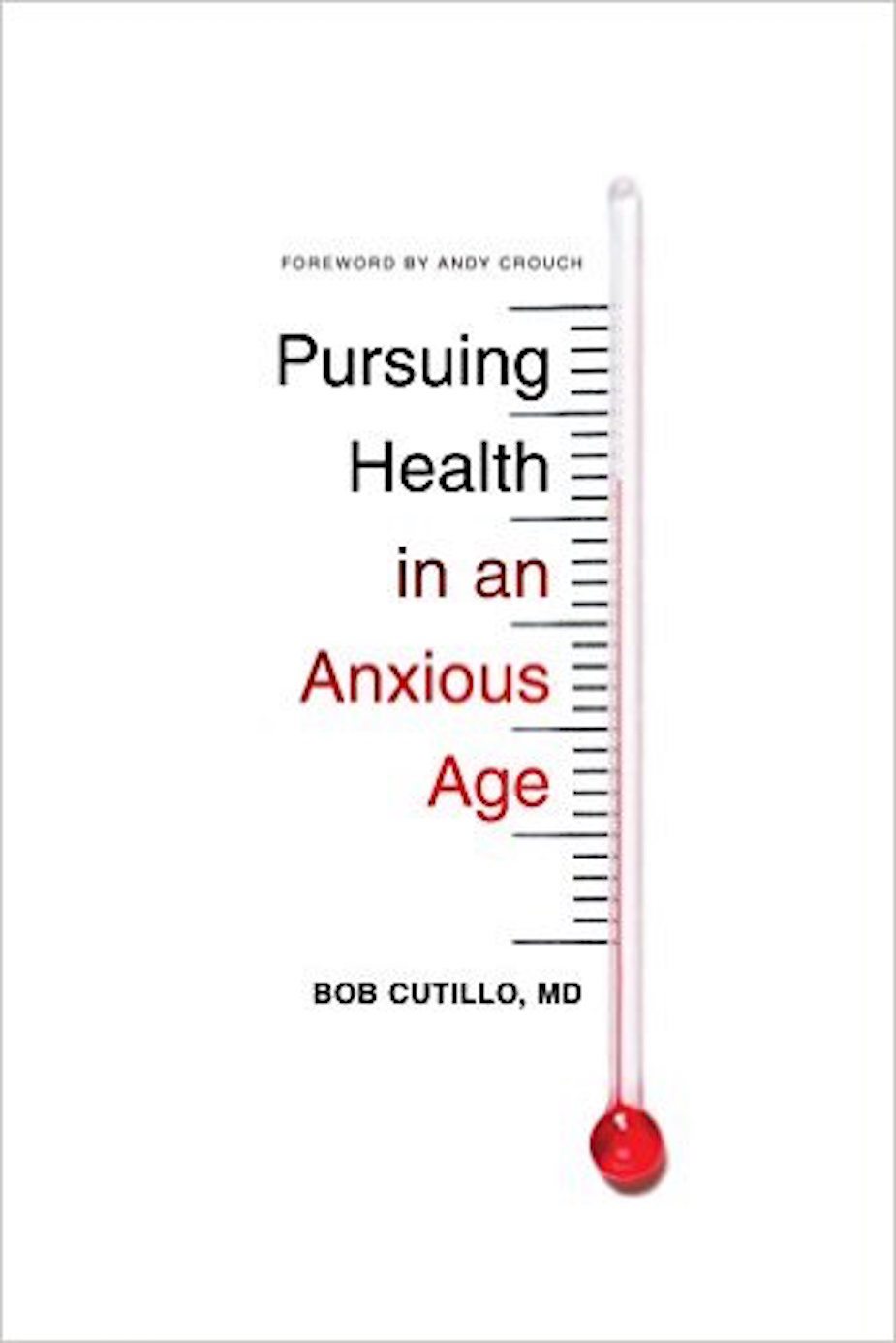The world of modern healthcare has become a complex and, for many, a frustrating place. Administrators wrestle with rising costs, physicians and other providers wade through mountains of regulations, and patients struggle within a system that sees them as data points on a page instead of persons with deeply human problems. All of these issues, and many more, explain why so many individuals despair over the state of their healthcare.
Dr. Bob Cutillo is a family physician and seminary professor who offers unique insight into modern medicine. His book, Pursuing Health in an Anxious Age [read Andy Crouch’s foreword], not only tackles new subjects not found in other faith-centered health texts, but also gets to the theological root of much of our anxiety these days. It’s a profound read, and one I’d thoroughly recommend both to those in the healthcare industry and also to those interested in seeing healthcare through a new fresh lens.
Hope for Health
Cutillo begins his book with a look at the theological root of our current cultural anxiety. Our expectation for healthcare has become derailed since we’re asking something of healthcare it can’t offer—ultimate safety and security.
We expect that if we choose the right hospital, find the right physician, follow the right diet, and do all the other “right” things, we’re basically guaranteed a safe and healthy life. What we’re grasping for here isn’t so much health but control. Cutillo diagnoses our problem with keen perception:
Somehow the idea that life can be controlled to our satisfaction by a mixture of good behavior, good choices, good medicine, or a good God—if he does what we expect—enters into the pores of our being without our notice. (35)
Of course, since we believe our flourishing finally depends on us making the right choices, we’re constantly anxious. Instead of trusting a loving God working his purpose through (or in spite of) our choices, we begin seeing our decisions as supremely important—since a poor one could be catastrophic:
This places intense pressure on the reliability of our personal decisions, thus making us uniquely anxious in our choices. No wonder we plan incessantly in order to minimize chance and contingency. If we get it wrong, so we think, there is nothing in a hostile and impersonal universe that will rescue us. (65)

Pursuing Health in an Anxious Age
Bob Cutillo
Our culture’s hope for health, then, is hope for control and independence. Such hope is rooted in a fantasy, however, since no amount of healthcare can untether us from uncertainty.
What You See Depends on How You Look
Cutillo also discusses how medicine has reduced patients to simply anatomical “parts” and disease states—or worse with the digital explosion, as data points on a regression curve. Cutillo traces the origins of this reductionist tendency back to the philosophy of the ancient Gnostics, who saw the body as a hindrance to the soul. He then presents our scramble to dominate and control our health as a form of modern Gnosticism trying to free us from the confines of our natural bodies.
This lust for control through reductionism and ever-more-refined quantification changes our view of people from individuals crafted in God’s image to crude compilations of bit patterns that need to be sorted and sifted. Cutillo offers multiple examples of this improper view in medicine, and how it leads to problems. Our trouble in medicine is that—try as we may—there’s still an aspect of human interaction and disease that can’t be quantified, and no label perfectly describes a person regardless of their diagnostic state.
When patients are treated as plots on a curve instead of unique individuals, many begin fretting unnecessarily about remote future risks while ignoring more pressing issues they face “today.” In this way, our overwhelming dependence on data and “evidence-based medicine” not only misses that patients are still individuals with specific circumstances, resources, and cultural predispositions, but in its own way actually furthers the anxiety of patients instead of helping them heal.
Cutillo’s answer to this predicament is to change our gaze. First, begin by realizing that since the individual is both made and uniquely loved by God, we should begin our interactions with a “bias toward love.” Second, as we begin to see the individual through a lens of love, we can appreciate the particularities in their life and situation. Third, the awareness that God is in control—and that we’ll never be—frees us to remain open to surprise.
These three elements help us to reorient our gaze in a more humble and hopeful direction. Instead of forcing patients into categories, we can peacefully embrace God’s providence in every encounter:
[This reorientation] turns the person in front of us from a fixed image of our own making to an image of God that makes every encounter potentially sacred. We pause in such a moment and, in our recognition of the dignity and respect that each deserves, invite unforeseen possibilities for hope and healing. And what greater surprise could there be, while seeking the goodness of God in your life, that the person who is changed most is me. (107)
Reimagining the Good of Health
Ultimately, our thirst for control and our anxiety about the future is driven by our fear of death. This fear pushes us away from our vulnerability toward tendencies and longings to create an invulnerable world. However, Cutillo observes:
When we live as if we are invulnerable, every threat frightens us, making our desire for control greater and our need to separate ourselves stronger. But when we acknowledge our common condition, it opens our hearts to care. Sharing the vulnerability of life with others may even help us perceive a mystery that the usual senses would normally miss. (140)
The gospel of Jesus Christ radically alters our view of health by undermining and eventually overcoming our fear of death. When fear no longer controls us, we’re able to experience vulnerability and true freedom in community. This community then causes us to grow in ways we couldn’t predict, and in ways we wouldn’t be able to on our own.
By re-imagining healthcare as a way to serve one another and grow together in community—instead of a way to win control over our lives and circumstances—we’re able to restore its proper place in our lives as healthcare professionals, consumers of health services, and individuals created in the image of a God who loves us in the details.
Pursuing Health in an Anxious Age is a refreshing look at the world of healthcare. Those who want to see health through new eyes are encouraged to read it.
Author’s note: All views expressed in this book review are my own, and should not be attributed to any organization, employer, or entity, whether public or private.





























